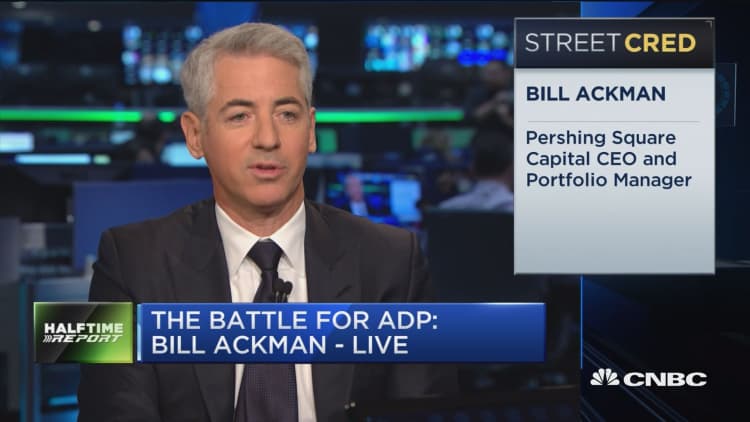
Bill Ackman fired back at Automatic Data Processing's management on CNBC's "Halftime Report" Wednesday.
The investor responded to a question on the company's presentation comparing ADP's stock performance under its CEO versus his hedge fund track record.
"Those numbers are not correct and one of the things we're going to point out in a presentation we're going to release tomorrow is that the company overstates their total shareholder return under the CEO's track record," said the hedge fund manager, claiming ADP starts the calculation of the figure the day after the new CEO began, among other alleged mistakes.
Ackman also cited how the return included the stock performance of CDK Global, which was spun off from the company in 2014.
In a statement on Aug. 4, ADP compared its six-year stock performance under Rodriguez to Pershing Square's hedge-fund returns from 2012 to 2016.
"Since Carlos Rodriguez became CEO nearly six years ago, ADP's total shareholder return of 202% is well in excess of the S&P 500 TSR of 128% - and is many multiples of Pershing's TSR of 29%," the company said.
The hedge fund manager said ADP needed to make changes or it may face challenges like other big technology companies that didn't innovate.
"I'm not saying ADP is IBM today, but it is at risk of becoming IBM if they don't take seriously the competitive threats they face and if they don't run their businesses as efficiently as they can," he said.
His hedge fund Pershing Square Capital Management has nominated three directors to ADP's board, including Ackman, for the Nov. 7 annual meeting.
The firm said in a letter to shareholders Wednesday it has a $2.3 billion investment stake in ADP and is "not seeking control of the company."
Last month ADP disclosed it had been approached by Ackman, and the two sides have engaged in a war of words since then.
ADP CEO Carlos Rodriguez told CNBC on Aug. 10 that Bill Ackman reminds him of a "spoiled brat" who wants a schoolteacher to give him an extension. Ackman revealed his "transformation plan" for ADP on Aug. 17 to more than double the company's stock price in an 167 slide presentation.
ADP's profit "margins are vastly below where they should be," Ackman said on a conference call, walking listeners through Pershing Square's analysis and research. "ADP's historical success has made it a lethargic and inefficient sleeping giant," he wrote in the presentation.
His hedge fund has stumbled in recent years with high-profile losing bets on Valeant Pharmaceuticals and Chipotle Mexican Grill.
Pershing Square Holdings is underperforming the market this year. The fund is down 7.3 percent year to date through Sept. 12, according to its website. By contrast, the S&P 500 has an 11.5 percent return in the same time period.
An ADP spokesperson sent the following statement in response to this story:
"Pershing Square's claim that ADP has underperformed is not based on the facts. ADP has generated total shareholder returns in excess of 200% since Carlos Rodriguez became CEO nearly six years ago, significantly outperforming the S&P 500 and its peers. Over that same period, ADP has increased margins in core operations by 580 basis points, and continues to pursue an aggressive long-term strategy to further improve service and client satisfaction through technology transformation while driving revenue growth and margin expansion. ADP's Board is concerned that Pershing Square's extreme, swing-for-the-fences proposals and unqualified nominees would disrupt client services and damage relationships, putting ADP – and the value of shareholders' investments – at significant risk."
— CNBC's Liz Moyer contributed to this story.


